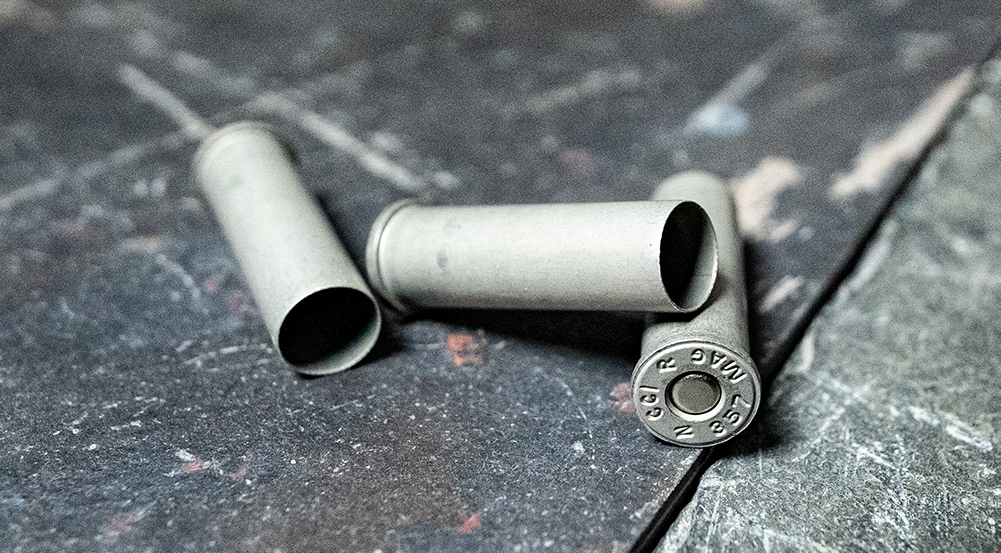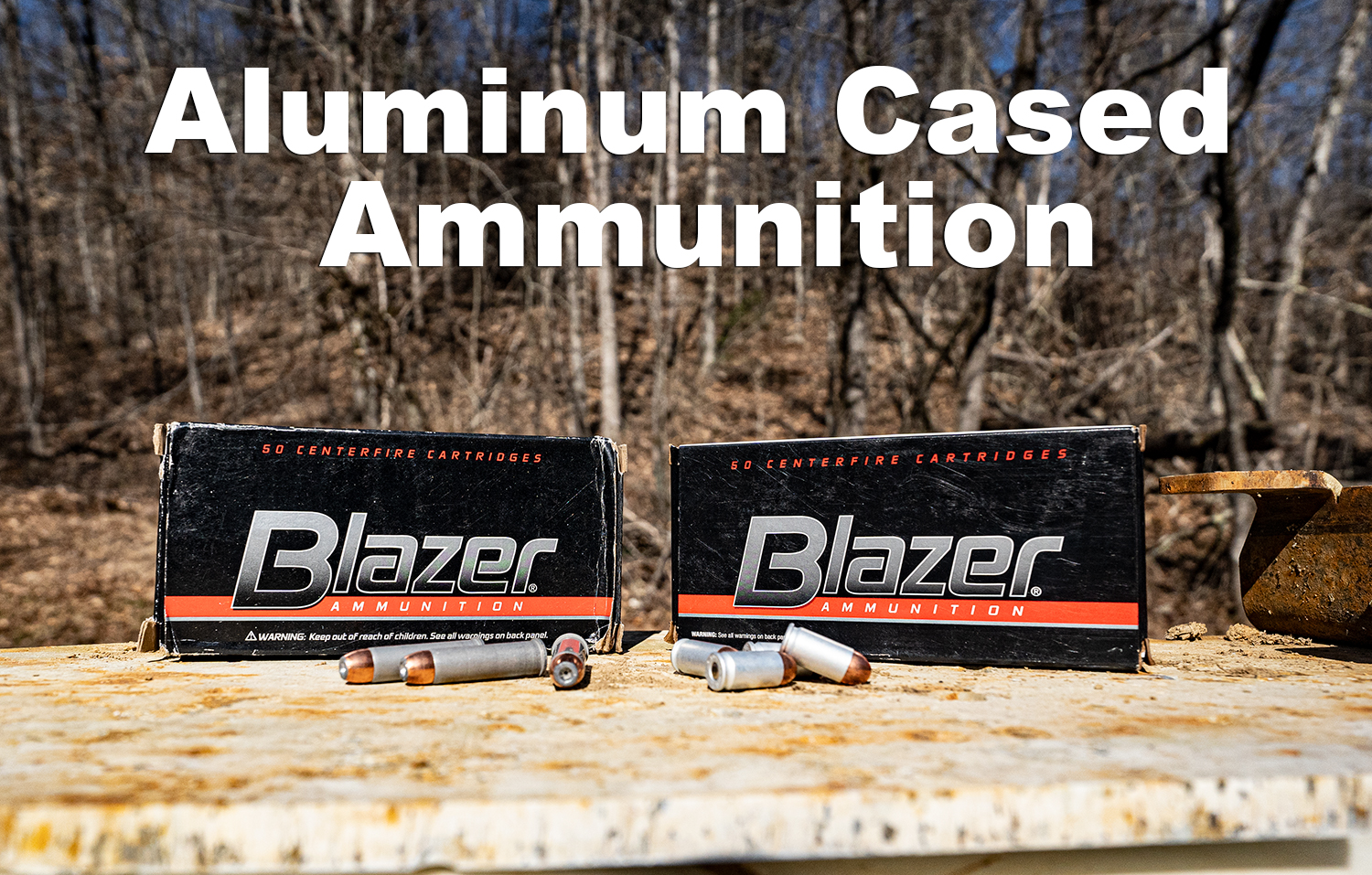A shooter’s guide to aluminum cased ammunition. Why is it cheaper than brass and what are the differences?
If you’re serious about training, you know how much ammo costs can add up. Price is paramount for shooters when they’re picking ammo. So, any opportunity to save is likely going to get your attention as a serious shooter. As we look for cheap ammo, we’re seeing more and more manufacturers turn to aluminum cases instead of brass or steel. So, what separates aluminum cased ammo from steel or brass cased rounds?
Why Aluminum Cases?

When commodity prices — especially prices on copper go up, it has a direct impact on what manufacturers pay to make ammo. In turn, we are all asked to pay more for those rounds. As you might know, copper is a key component in making brass. Brass is the most sought after material for ammunition casings.
As copper goes up in price, so too does brass. As brass goes up in price, so too will most ammunition.
But brass cases are not the only option. Many manufacturers can shift their brass-cased production to aluminum-cased in an attempt to meet consumer demand for cheap ammo. In the very near future. As the 21st century has gone on, we’ve seen a higher percentage of aluminum cases coming out of manufacturers.
Aluminum has its advantages and disadvantages, and understanding how it performs can help you decide whether this is a good choice for your firearm.
Advantages of Aluminum Cased Ammunition
As we’ve noted, the main advantage to aluminum casing is the price. While ammunition can fluctuate in pricing, and you may find overlapping prices between products, aluminum-cased ammunition is sometimes half the price of comparable rounds. As we’ve noted, the cost of brass, and therefore brass casing, is heavily dependent on the price of copper. And because copper is used in so many applications, this metal can fluctuate wildly from one month to another. This fluctuation makes it difficult to predict prices of many materials, including brass-based rounds.
Aluminum is cheaper and tends to have less cost fluctuation, which makes manufacturers confident that they can design, manufacture, and distribute aluminum-based ammo at a more predictable price point.
With pricing significantly lower in most cases, you can fire a high number of aluminum cases without a large impact on your wallet. If you are a target shooter who likes to spend hours at the range, you may find that aluminum cases are the right choice for your specific needs.
Aluminum is also lighter than brass. In fact, it’s considered to be the lightest possible casing material currently available. For many people, this may not be an issue, as the weight of brass isn’t noticed when loading even a dozen rounds at a time. But if you are carrying large quantities of ammo for a hunting expedition, it may be an advantage. Of course, the light-weight nature of aluminum has an obvious advantage for military and police applications as well.
Disadvantages of Aluminum Cased Ammunition
Consistency and reliability is the main concern for aluminum-cased ammunition. While you can find many gun owners who have purchased aluminum ammo and found it to be perfectly reliable, there are others that have had problems, particularly in semi-automatic weapons.
The issue appears to come when ejecting a spent cartridge; it’s not that the old cartridge gets jammed in the ejection port, creating the “smokestack” that is known by almost all shooters. Rather, the problem appears to commonly occur in the chamber itself. Essentially, the case can jam in place, basically lodging itself in the barrel. Users then have to use a paper clip or thin knife to extract the case.
It seems that this problem is caused by expansion of the case. Aluminum expands more when hot, causing it to get tight inside the chamber after being fired.
A lot will depend on the specific ammunition and your firearm, but it’s a common concern for these cartridges. It would appear that while aluminum may create problems for semiautomatics, revolvers and bolt-action rifles have little to no issue with aluminum cases.
Another concern for some shooters is the fact (or theory, depending on who you ask) that you can’t reload aluminum cases. Although the metal is strong and durable, it does have a lower melting point than both brass and steel. This means that an aluminum case that has been fired simply does not maintain the strength and consistency of other case materials, which is why many do not recommend reloading aluminum, even if the case looks just fine. Due to the nature of the metal, opening and closing the neck is more difficult and less reliable, once again making the aluminum case problematic reloading.
Does Aluminum Create a Ballistics Change?
Whenever you use a new material for ammunition, there is an obvious concern for performance. However, we can find no evidence that an aluminum-cased cartridge performs any different than a brass-cased round.
As an example, we can look at Blazer 9mm brass and aluminum cartridges. Both have a 124-grain FMJ bullet and are intended for target shooting. The performances, at least according to the manufacturer, are exactly the same. Both come out of the barrel at a speed of 1,090 fps, and both maintain a velocity of 965 fps at 100 yards. Both have muzzle energies of 327 ft-lbs and keep 256 ft-lbs of energy at 100 yards. Apparently the manufacturer (CCI) is so confident that these cartridges perform the same that they slap the exact same stats on both products.
Does Aluminum Harm Your Weapon?
Finally, there is a concern that aluminum cases could harm your weapon, but there seems to be little evidence here. The concern is that aluminum may be harder than brass and create gouges in the chamber, but this does not seem to be the case.
Steel, for example, is harder but is coated with lubricating lacquer. This lacquer, however, can gum up the chamber. But there is no coating on aluminum rounds, so this is not a concern. (Learn more about steel-cased ammo versus brass cased ammo here.)
Find Affordable Rounds for Any Purpose Right Here
We offer a lot of American-made Blazer aluminum cased rounds for sale at AmmoToGo.com. You can find the the following loads in-stock most of the time and at some savings over the brass-cased counterparts known as “Blazer Brass.”



